Research Essay: Leadership in Business Decision Making, BUSS 5397
VerifiedAdded on 2023/01/11
|7
|1932
|42
Essay
AI Summary
This essay explores the multifaceted realm of leadership, delving into recent academic studies and their implications for business decision-making. It examines four key leadership styles: ethical, entrepreneurial, strategic, and transformational leadership, highlighting their distinct characteristics and influence on follower behavior and organizational outcomes. The essay analyzes four recently published articles, including a meta-analytic review of ethical leadership outcomes, an exploration of innovation and dynamic capabilities in VUCA environments, an investigation into the compassionate aspects of ethical leadership, and an examination of follower responses to transformational leadership. These articles provide insights into the relationships between leadership styles, follower perceptions, and business success, emphasizing the importance of understanding leadership's impact on both individual and organizational levels. The essay underscores the significance of leadership in guiding followers, driving organizational innovation, and adapting to dynamic business environments.
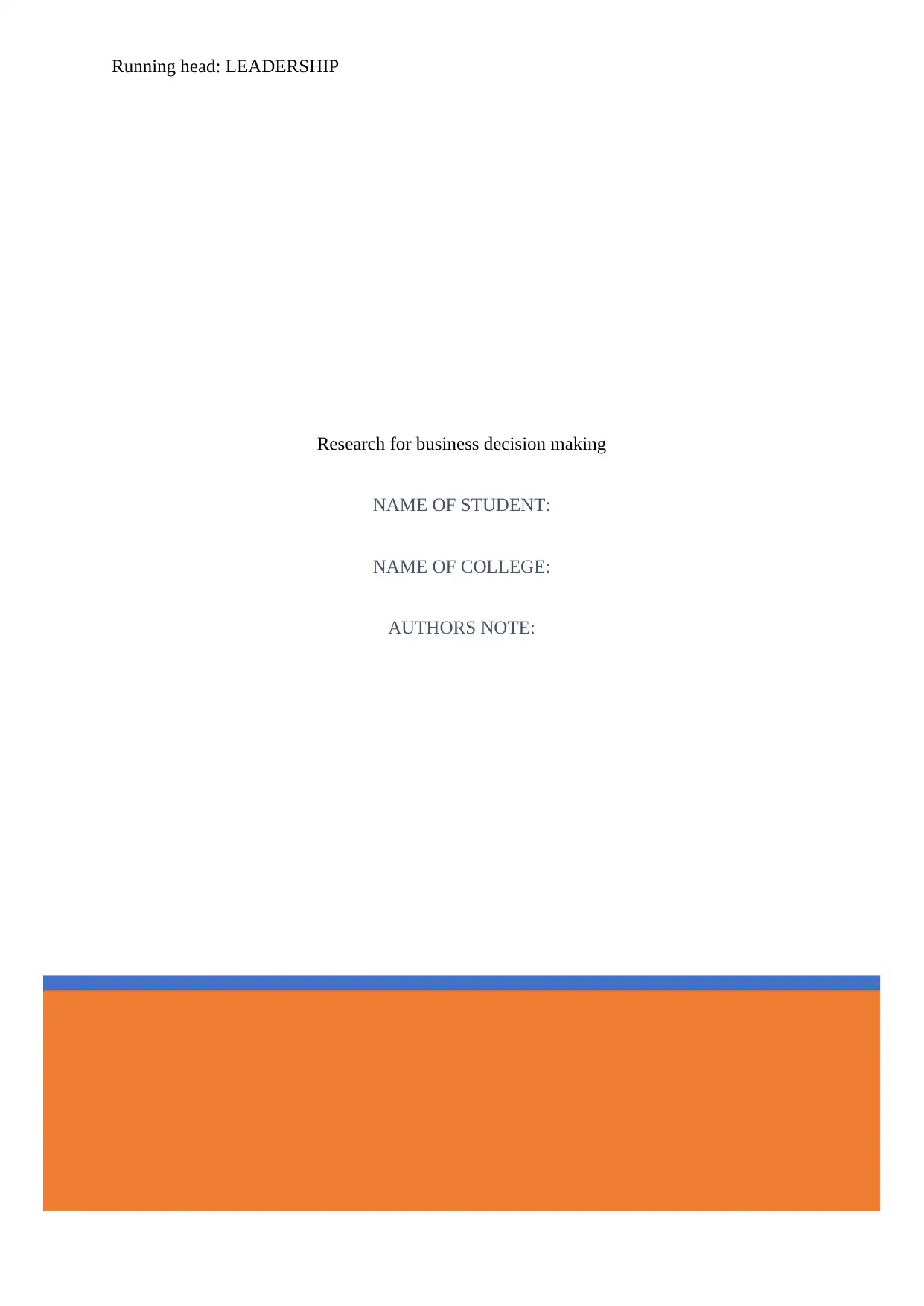
Research for business decision making
NAME OF STUDENT:
NAME OF COLLEGE:
AUTHORS NOTE:
Running head: LEADERSHIP
NAME OF STUDENT:
NAME OF COLLEGE:
AUTHORS NOTE:
Running head: LEADERSHIP
Paraphrase This Document
Need a fresh take? Get an instant paraphrase of this document with our AI Paraphraser
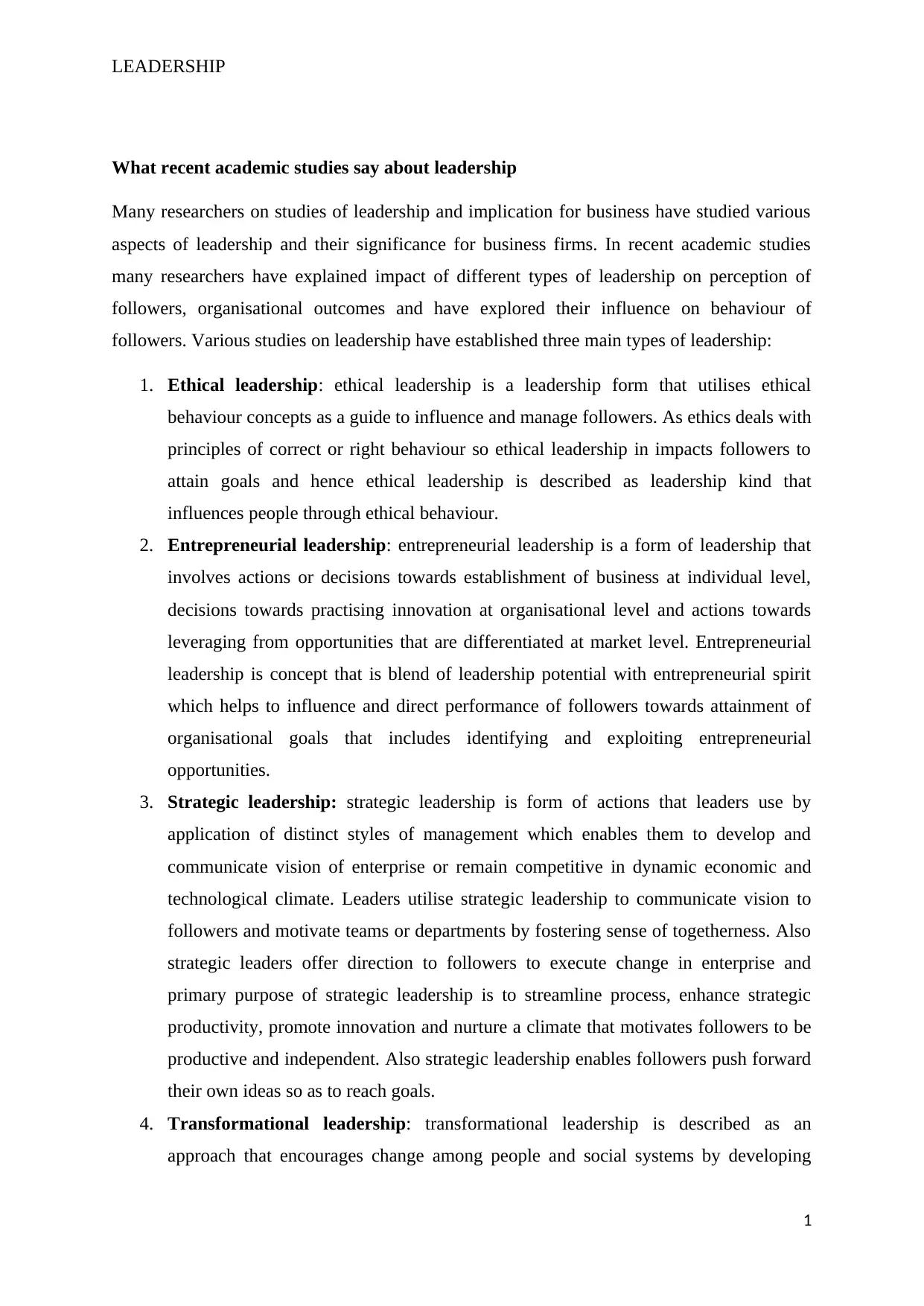
LEADERSHIP
What recent academic studies say about leadership
Many researchers on studies of leadership and implication for business have studied various
aspects of leadership and their significance for business firms. In recent academic studies
many researchers have explained impact of different types of leadership on perception of
followers, organisational outcomes and have explored their influence on behaviour of
followers. Various studies on leadership have established three main types of leadership:
1. Ethical leadership: ethical leadership is a leadership form that utilises ethical
behaviour concepts as a guide to influence and manage followers. As ethics deals with
principles of correct or right behaviour so ethical leadership in impacts followers to
attain goals and hence ethical leadership is described as leadership kind that
influences people through ethical behaviour.
2. Entrepreneurial leadership: entrepreneurial leadership is a form of leadership that
involves actions or decisions towards establishment of business at individual level,
decisions towards practising innovation at organisational level and actions towards
leveraging from opportunities that are differentiated at market level. Entrepreneurial
leadership is concept that is blend of leadership potential with entrepreneurial spirit
which helps to influence and direct performance of followers towards attainment of
organisational goals that includes identifying and exploiting entrepreneurial
opportunities.
3. Strategic leadership: strategic leadership is form of actions that leaders use by
application of distinct styles of management which enables them to develop and
communicate vision of enterprise or remain competitive in dynamic economic and
technological climate. Leaders utilise strategic leadership to communicate vision to
followers and motivate teams or departments by fostering sense of togetherness. Also
strategic leaders offer direction to followers to execute change in enterprise and
primary purpose of strategic leadership is to streamline process, enhance strategic
productivity, promote innovation and nurture a climate that motivates followers to be
productive and independent. Also strategic leadership enables followers push forward
their own ideas so as to reach goals.
4. Transformational leadership: transformational leadership is described as an
approach that encourages change among people and social systems by developing
1
What recent academic studies say about leadership
Many researchers on studies of leadership and implication for business have studied various
aspects of leadership and their significance for business firms. In recent academic studies
many researchers have explained impact of different types of leadership on perception of
followers, organisational outcomes and have explored their influence on behaviour of
followers. Various studies on leadership have established three main types of leadership:
1. Ethical leadership: ethical leadership is a leadership form that utilises ethical
behaviour concepts as a guide to influence and manage followers. As ethics deals with
principles of correct or right behaviour so ethical leadership in impacts followers to
attain goals and hence ethical leadership is described as leadership kind that
influences people through ethical behaviour.
2. Entrepreneurial leadership: entrepreneurial leadership is a form of leadership that
involves actions or decisions towards establishment of business at individual level,
decisions towards practising innovation at organisational level and actions towards
leveraging from opportunities that are differentiated at market level. Entrepreneurial
leadership is concept that is blend of leadership potential with entrepreneurial spirit
which helps to influence and direct performance of followers towards attainment of
organisational goals that includes identifying and exploiting entrepreneurial
opportunities.
3. Strategic leadership: strategic leadership is form of actions that leaders use by
application of distinct styles of management which enables them to develop and
communicate vision of enterprise or remain competitive in dynamic economic and
technological climate. Leaders utilise strategic leadership to communicate vision to
followers and motivate teams or departments by fostering sense of togetherness. Also
strategic leaders offer direction to followers to execute change in enterprise and
primary purpose of strategic leadership is to streamline process, enhance strategic
productivity, promote innovation and nurture a climate that motivates followers to be
productive and independent. Also strategic leadership enables followers push forward
their own ideas so as to reach goals.
4. Transformational leadership: transformational leadership is described as an
approach that encourages change among people and social systems by developing
1
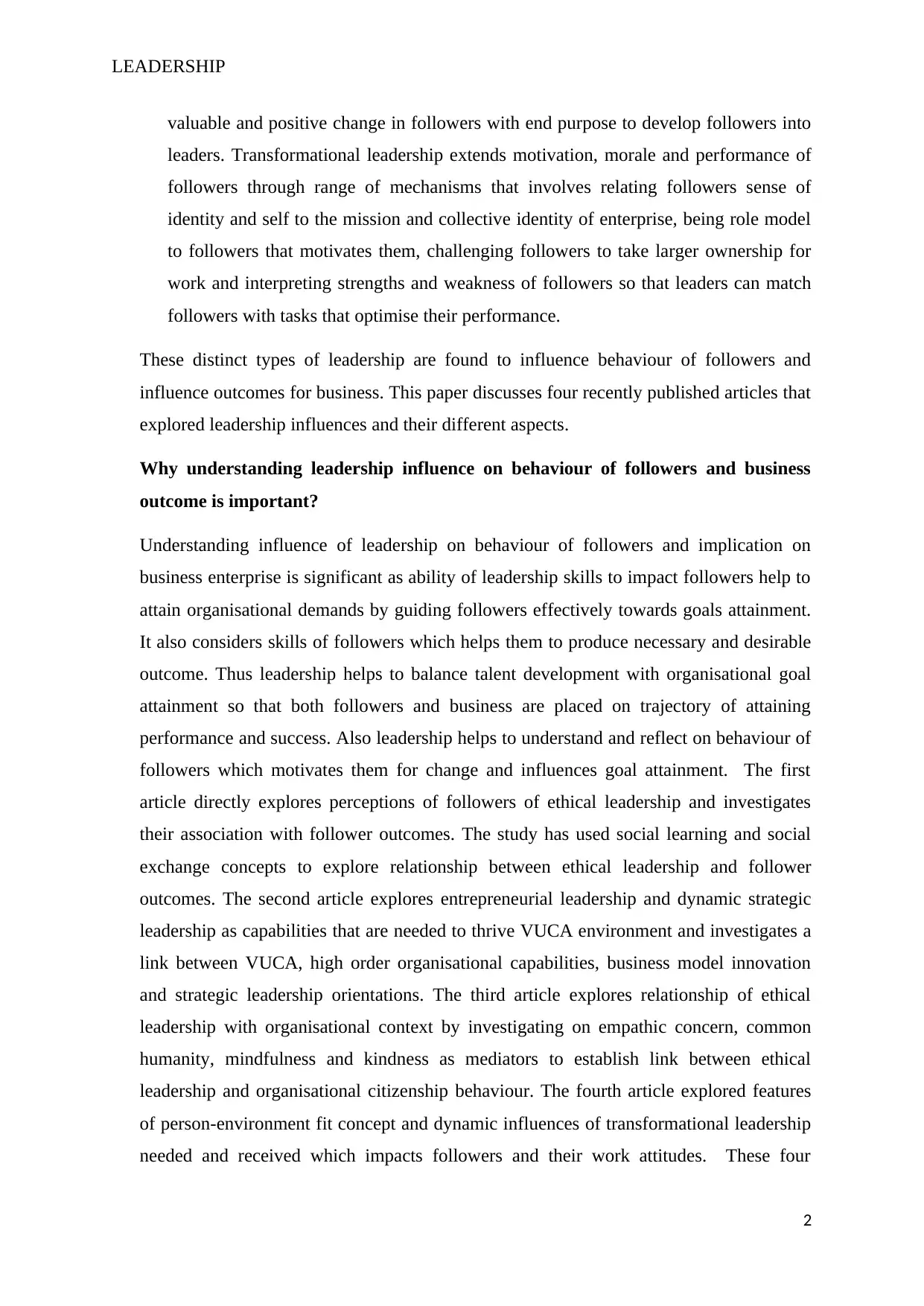
LEADERSHIP
valuable and positive change in followers with end purpose to develop followers into
leaders. Transformational leadership extends motivation, morale and performance of
followers through range of mechanisms that involves relating followers sense of
identity and self to the mission and collective identity of enterprise, being role model
to followers that motivates them, challenging followers to take larger ownership for
work and interpreting strengths and weakness of followers so that leaders can match
followers with tasks that optimise their performance.
These distinct types of leadership are found to influence behaviour of followers and
influence outcomes for business. This paper discusses four recently published articles that
explored leadership influences and their different aspects.
Why understanding leadership influence on behaviour of followers and business
outcome is important?
Understanding influence of leadership on behaviour of followers and implication on
business enterprise is significant as ability of leadership skills to impact followers help to
attain organisational demands by guiding followers effectively towards goals attainment.
It also considers skills of followers which helps them to produce necessary and desirable
outcome. Thus leadership helps to balance talent development with organisational goal
attainment so that both followers and business are placed on trajectory of attaining
performance and success. Also leadership helps to understand and reflect on behaviour of
followers which motivates them for change and influences goal attainment. The first
article directly explores perceptions of followers of ethical leadership and investigates
their association with follower outcomes. The study has used social learning and social
exchange concepts to explore relationship between ethical leadership and follower
outcomes. The second article explores entrepreneurial leadership and dynamic strategic
leadership as capabilities that are needed to thrive VUCA environment and investigates a
link between VUCA, high order organisational capabilities, business model innovation
and strategic leadership orientations. The third article explores relationship of ethical
leadership with organisational context by investigating on empathic concern, common
humanity, mindfulness and kindness as mediators to establish link between ethical
leadership and organisational citizenship behaviour. The fourth article explored features
of person-environment fit concept and dynamic influences of transformational leadership
needed and received which impacts followers and their work attitudes. These four
2
valuable and positive change in followers with end purpose to develop followers into
leaders. Transformational leadership extends motivation, morale and performance of
followers through range of mechanisms that involves relating followers sense of
identity and self to the mission and collective identity of enterprise, being role model
to followers that motivates them, challenging followers to take larger ownership for
work and interpreting strengths and weakness of followers so that leaders can match
followers with tasks that optimise their performance.
These distinct types of leadership are found to influence behaviour of followers and
influence outcomes for business. This paper discusses four recently published articles that
explored leadership influences and their different aspects.
Why understanding leadership influence on behaviour of followers and business
outcome is important?
Understanding influence of leadership on behaviour of followers and implication on
business enterprise is significant as ability of leadership skills to impact followers help to
attain organisational demands by guiding followers effectively towards goals attainment.
It also considers skills of followers which helps them to produce necessary and desirable
outcome. Thus leadership helps to balance talent development with organisational goal
attainment so that both followers and business are placed on trajectory of attaining
performance and success. Also leadership helps to understand and reflect on behaviour of
followers which motivates them for change and influences goal attainment. The first
article directly explores perceptions of followers of ethical leadership and investigates
their association with follower outcomes. The study has used social learning and social
exchange concepts to explore relationship between ethical leadership and follower
outcomes. The second article explores entrepreneurial leadership and dynamic strategic
leadership as capabilities that are needed to thrive VUCA environment and investigates a
link between VUCA, high order organisational capabilities, business model innovation
and strategic leadership orientations. The third article explores relationship of ethical
leadership with organisational context by investigating on empathic concern, common
humanity, mindfulness and kindness as mediators to establish link between ethical
leadership and organisational citizenship behaviour. The fourth article explored features
of person-environment fit concept and dynamic influences of transformational leadership
needed and received which impacts followers and their work attitudes. These four
2
⊘ This is a preview!⊘
Do you want full access?
Subscribe today to unlock all pages.

Trusted by 1+ million students worldwide
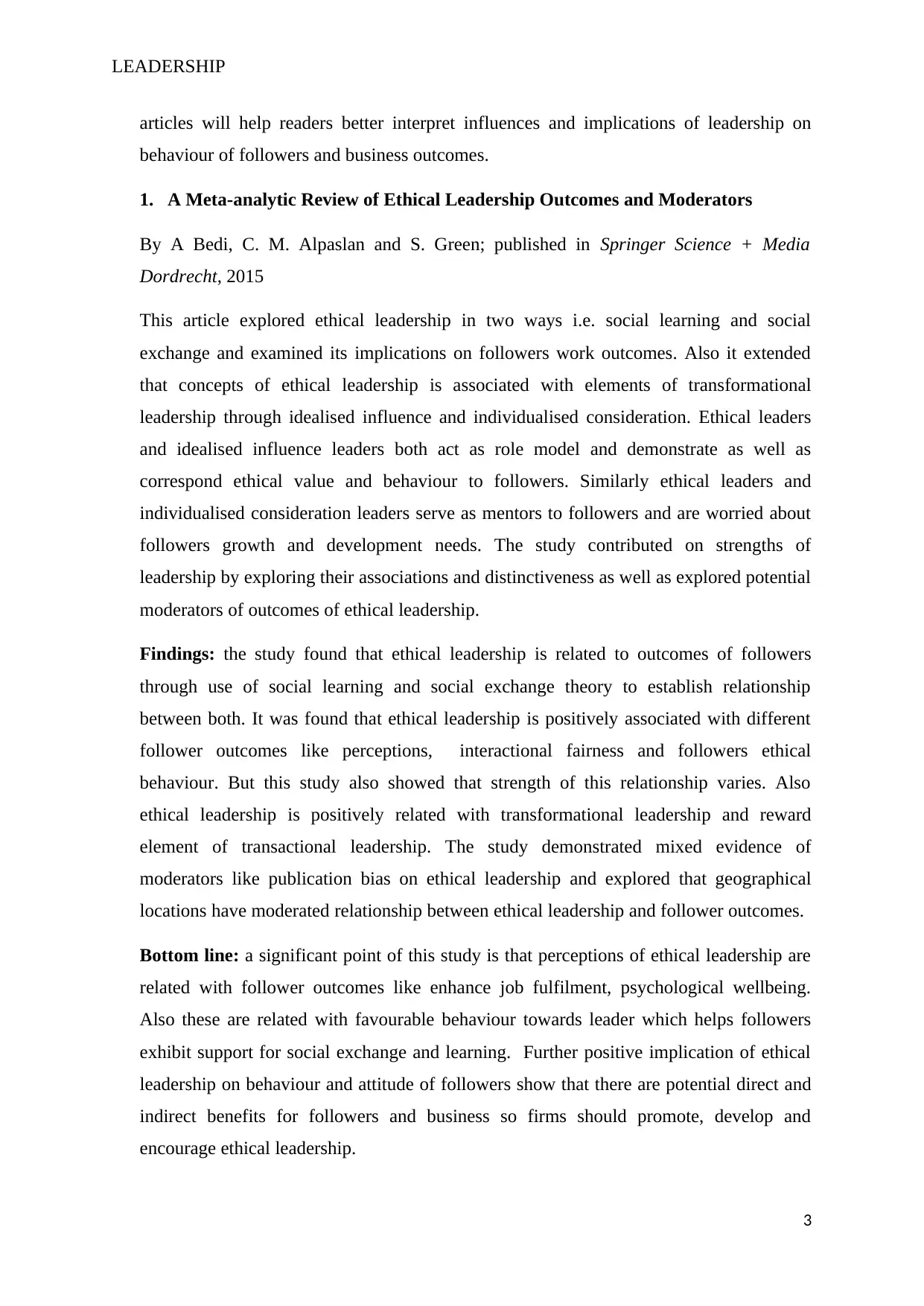
LEADERSHIP
articles will help readers better interpret influences and implications of leadership on
behaviour of followers and business outcomes.
1. A Meta-analytic Review of Ethical Leadership Outcomes and Moderators
By A Bedi, C. M. Alpaslan and S. Green; published in Springer Science + Media
Dordrecht, 2015
This article explored ethical leadership in two ways i.e. social learning and social
exchange and examined its implications on followers work outcomes. Also it extended
that concepts of ethical leadership is associated with elements of transformational
leadership through idealised influence and individualised consideration. Ethical leaders
and idealised influence leaders both act as role model and demonstrate as well as
correspond ethical value and behaviour to followers. Similarly ethical leaders and
individualised consideration leaders serve as mentors to followers and are worried about
followers growth and development needs. The study contributed on strengths of
leadership by exploring their associations and distinctiveness as well as explored potential
moderators of outcomes of ethical leadership.
Findings: the study found that ethical leadership is related to outcomes of followers
through use of social learning and social exchange theory to establish relationship
between both. It was found that ethical leadership is positively associated with different
follower outcomes like perceptions, interactional fairness and followers ethical
behaviour. But this study also showed that strength of this relationship varies. Also
ethical leadership is positively related with transformational leadership and reward
element of transactional leadership. The study demonstrated mixed evidence of
moderators like publication bias on ethical leadership and explored that geographical
locations have moderated relationship between ethical leadership and follower outcomes.
Bottom line: a significant point of this study is that perceptions of ethical leadership are
related with follower outcomes like enhance job fulfilment, psychological wellbeing.
Also these are related with favourable behaviour towards leader which helps followers
exhibit support for social exchange and learning. Further positive implication of ethical
leadership on behaviour and attitude of followers show that there are potential direct and
indirect benefits for followers and business so firms should promote, develop and
encourage ethical leadership.
3
articles will help readers better interpret influences and implications of leadership on
behaviour of followers and business outcomes.
1. A Meta-analytic Review of Ethical Leadership Outcomes and Moderators
By A Bedi, C. M. Alpaslan and S. Green; published in Springer Science + Media
Dordrecht, 2015
This article explored ethical leadership in two ways i.e. social learning and social
exchange and examined its implications on followers work outcomes. Also it extended
that concepts of ethical leadership is associated with elements of transformational
leadership through idealised influence and individualised consideration. Ethical leaders
and idealised influence leaders both act as role model and demonstrate as well as
correspond ethical value and behaviour to followers. Similarly ethical leaders and
individualised consideration leaders serve as mentors to followers and are worried about
followers growth and development needs. The study contributed on strengths of
leadership by exploring their associations and distinctiveness as well as explored potential
moderators of outcomes of ethical leadership.
Findings: the study found that ethical leadership is related to outcomes of followers
through use of social learning and social exchange theory to establish relationship
between both. It was found that ethical leadership is positively associated with different
follower outcomes like perceptions, interactional fairness and followers ethical
behaviour. But this study also showed that strength of this relationship varies. Also
ethical leadership is positively related with transformational leadership and reward
element of transactional leadership. The study demonstrated mixed evidence of
moderators like publication bias on ethical leadership and explored that geographical
locations have moderated relationship between ethical leadership and follower outcomes.
Bottom line: a significant point of this study is that perceptions of ethical leadership are
related with follower outcomes like enhance job fulfilment, psychological wellbeing.
Also these are related with favourable behaviour towards leader which helps followers
exhibit support for social exchange and learning. Further positive implication of ethical
leadership on behaviour and attitude of followers show that there are potential direct and
indirect benefits for followers and business so firms should promote, develop and
encourage ethical leadership.
3
Paraphrase This Document
Need a fresh take? Get an instant paraphrase of this document with our AI Paraphraser
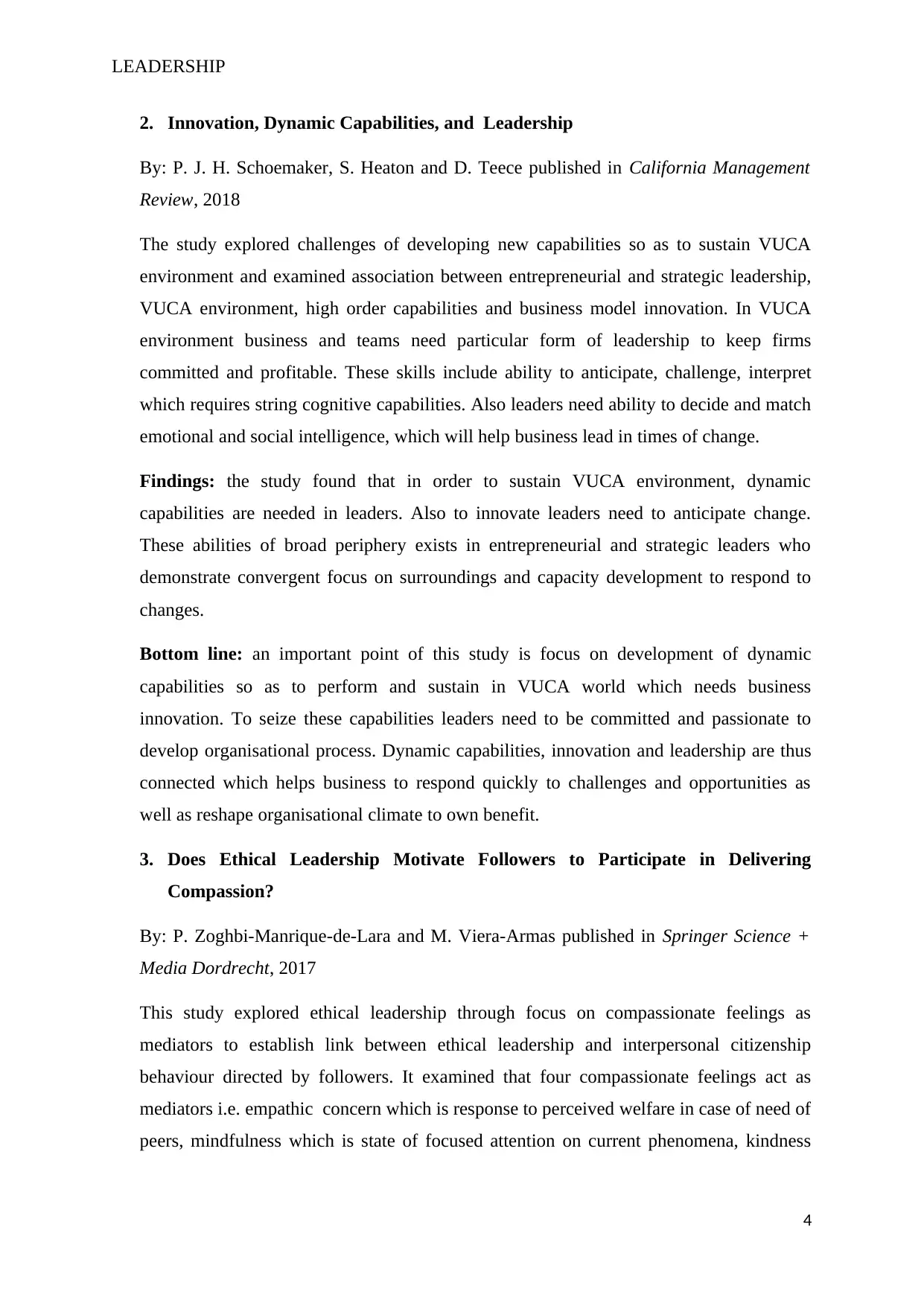
LEADERSHIP
2. Innovation, Dynamic Capabilities, and Leadership
By: P. J. H. Schoemaker, S. Heaton and D. Teece published in California Management
Review, 2018
The study explored challenges of developing new capabilities so as to sustain VUCA
environment and examined association between entrepreneurial and strategic leadership,
VUCA environment, high order capabilities and business model innovation. In VUCA
environment business and teams need particular form of leadership to keep firms
committed and profitable. These skills include ability to anticipate, challenge, interpret
which requires string cognitive capabilities. Also leaders need ability to decide and match
emotional and social intelligence, which will help business lead in times of change.
Findings: the study found that in order to sustain VUCA environment, dynamic
capabilities are needed in leaders. Also to innovate leaders need to anticipate change.
These abilities of broad periphery exists in entrepreneurial and strategic leaders who
demonstrate convergent focus on surroundings and capacity development to respond to
changes.
Bottom line: an important point of this study is focus on development of dynamic
capabilities so as to perform and sustain in VUCA world which needs business
innovation. To seize these capabilities leaders need to be committed and passionate to
develop organisational process. Dynamic capabilities, innovation and leadership are thus
connected which helps business to respond quickly to challenges and opportunities as
well as reshape organisational climate to own benefit.
3. Does Ethical Leadership Motivate Followers to Participate in Delivering
Compassion?
By: P. Zoghbi-Manrique-de-Lara and M. Viera-Armas published in Springer Science +
Media Dordrecht, 2017
This study explored ethical leadership through focus on compassionate feelings as
mediators to establish link between ethical leadership and interpersonal citizenship
behaviour directed by followers. It examined that four compassionate feelings act as
mediators i.e. empathic concern which is response to perceived welfare in case of need of
peers, mindfulness which is state of focused attention on current phenomena, kindness
4
2. Innovation, Dynamic Capabilities, and Leadership
By: P. J. H. Schoemaker, S. Heaton and D. Teece published in California Management
Review, 2018
The study explored challenges of developing new capabilities so as to sustain VUCA
environment and examined association between entrepreneurial and strategic leadership,
VUCA environment, high order capabilities and business model innovation. In VUCA
environment business and teams need particular form of leadership to keep firms
committed and profitable. These skills include ability to anticipate, challenge, interpret
which requires string cognitive capabilities. Also leaders need ability to decide and match
emotional and social intelligence, which will help business lead in times of change.
Findings: the study found that in order to sustain VUCA environment, dynamic
capabilities are needed in leaders. Also to innovate leaders need to anticipate change.
These abilities of broad periphery exists in entrepreneurial and strategic leaders who
demonstrate convergent focus on surroundings and capacity development to respond to
changes.
Bottom line: an important point of this study is focus on development of dynamic
capabilities so as to perform and sustain in VUCA world which needs business
innovation. To seize these capabilities leaders need to be committed and passionate to
develop organisational process. Dynamic capabilities, innovation and leadership are thus
connected which helps business to respond quickly to challenges and opportunities as
well as reshape organisational climate to own benefit.
3. Does Ethical Leadership Motivate Followers to Participate in Delivering
Compassion?
By: P. Zoghbi-Manrique-de-Lara and M. Viera-Armas published in Springer Science +
Media Dordrecht, 2017
This study explored ethical leadership through focus on compassionate feelings as
mediators to establish link between ethical leadership and interpersonal citizenship
behaviour directed by followers. It examined that four compassionate feelings act as
mediators i.e. empathic concern which is response to perceived welfare in case of need of
peers, mindfulness which is state of focused attention on current phenomena, kindness
4
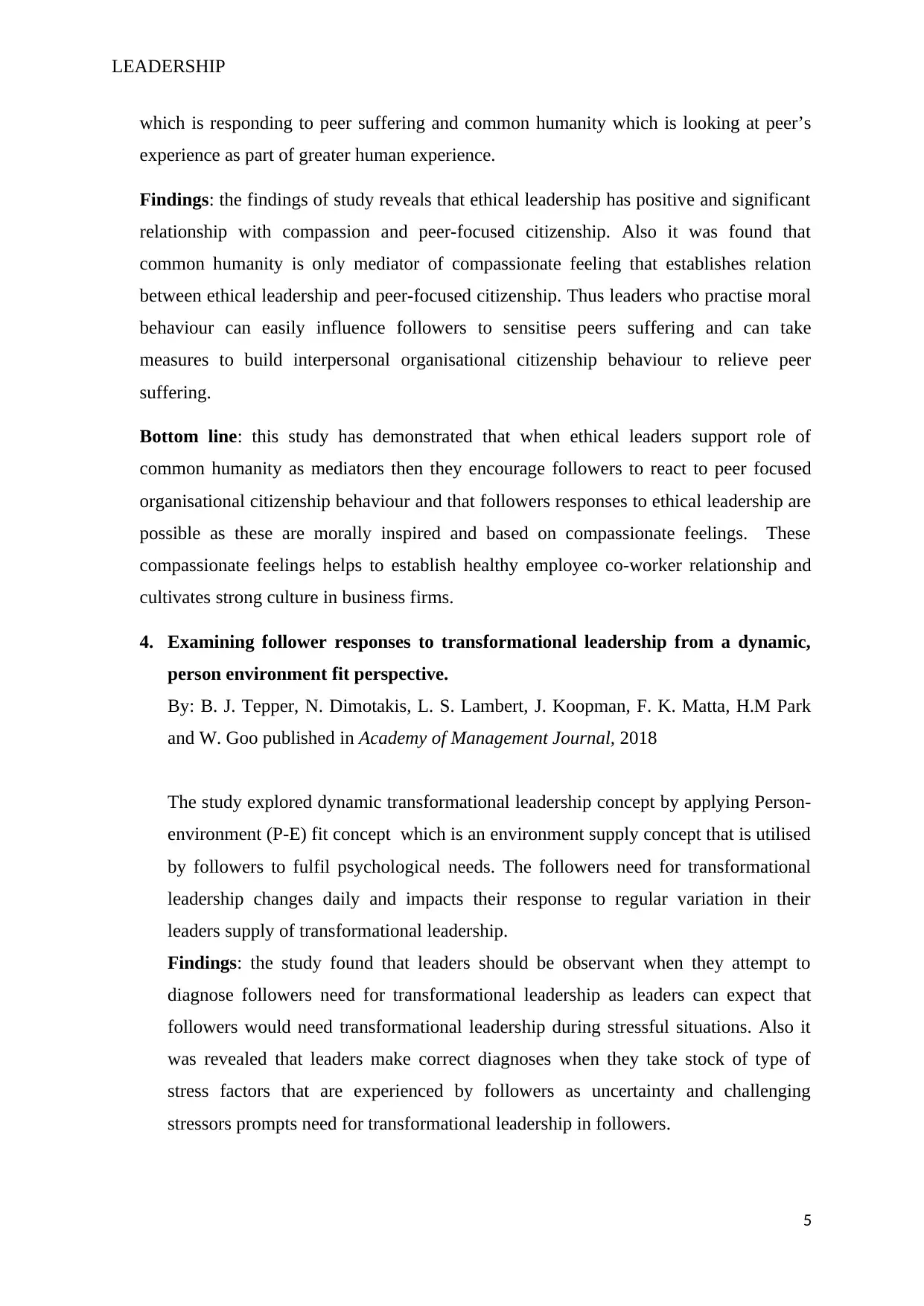
LEADERSHIP
which is responding to peer suffering and common humanity which is looking at peer’s
experience as part of greater human experience.
Findings: the findings of study reveals that ethical leadership has positive and significant
relationship with compassion and peer-focused citizenship. Also it was found that
common humanity is only mediator of compassionate feeling that establishes relation
between ethical leadership and peer-focused citizenship. Thus leaders who practise moral
behaviour can easily influence followers to sensitise peers suffering and can take
measures to build interpersonal organisational citizenship behaviour to relieve peer
suffering.
Bottom line: this study has demonstrated that when ethical leaders support role of
common humanity as mediators then they encourage followers to react to peer focused
organisational citizenship behaviour and that followers responses to ethical leadership are
possible as these are morally inspired and based on compassionate feelings. These
compassionate feelings helps to establish healthy employee co-worker relationship and
cultivates strong culture in business firms.
4. Examining follower responses to transformational leadership from a dynamic,
person environment fit perspective.
By: B. J. Tepper, N. Dimotakis, L. S. Lambert, J. Koopman, F. K. Matta, H.M Park
and W. Goo published in Academy of Management Journal, 2018
The study explored dynamic transformational leadership concept by applying Person-
environment (P-E) fit concept which is an environment supply concept that is utilised
by followers to fulfil psychological needs. The followers need for transformational
leadership changes daily and impacts their response to regular variation in their
leaders supply of transformational leadership.
Findings: the study found that leaders should be observant when they attempt to
diagnose followers need for transformational leadership as leaders can expect that
followers would need transformational leadership during stressful situations. Also it
was revealed that leaders make correct diagnoses when they take stock of type of
stress factors that are experienced by followers as uncertainty and challenging
stressors prompts need for transformational leadership in followers.
5
which is responding to peer suffering and common humanity which is looking at peer’s
experience as part of greater human experience.
Findings: the findings of study reveals that ethical leadership has positive and significant
relationship with compassion and peer-focused citizenship. Also it was found that
common humanity is only mediator of compassionate feeling that establishes relation
between ethical leadership and peer-focused citizenship. Thus leaders who practise moral
behaviour can easily influence followers to sensitise peers suffering and can take
measures to build interpersonal organisational citizenship behaviour to relieve peer
suffering.
Bottom line: this study has demonstrated that when ethical leaders support role of
common humanity as mediators then they encourage followers to react to peer focused
organisational citizenship behaviour and that followers responses to ethical leadership are
possible as these are morally inspired and based on compassionate feelings. These
compassionate feelings helps to establish healthy employee co-worker relationship and
cultivates strong culture in business firms.
4. Examining follower responses to transformational leadership from a dynamic,
person environment fit perspective.
By: B. J. Tepper, N. Dimotakis, L. S. Lambert, J. Koopman, F. K. Matta, H.M Park
and W. Goo published in Academy of Management Journal, 2018
The study explored dynamic transformational leadership concept by applying Person-
environment (P-E) fit concept which is an environment supply concept that is utilised
by followers to fulfil psychological needs. The followers need for transformational
leadership changes daily and impacts their response to regular variation in their
leaders supply of transformational leadership.
Findings: the study found that leaders should be observant when they attempt to
diagnose followers need for transformational leadership as leaders can expect that
followers would need transformational leadership during stressful situations. Also it
was revealed that leaders make correct diagnoses when they take stock of type of
stress factors that are experienced by followers as uncertainty and challenging
stressors prompts need for transformational leadership in followers.
5
⊘ This is a preview!⊘
Do you want full access?
Subscribe today to unlock all pages.

Trusted by 1+ million students worldwide
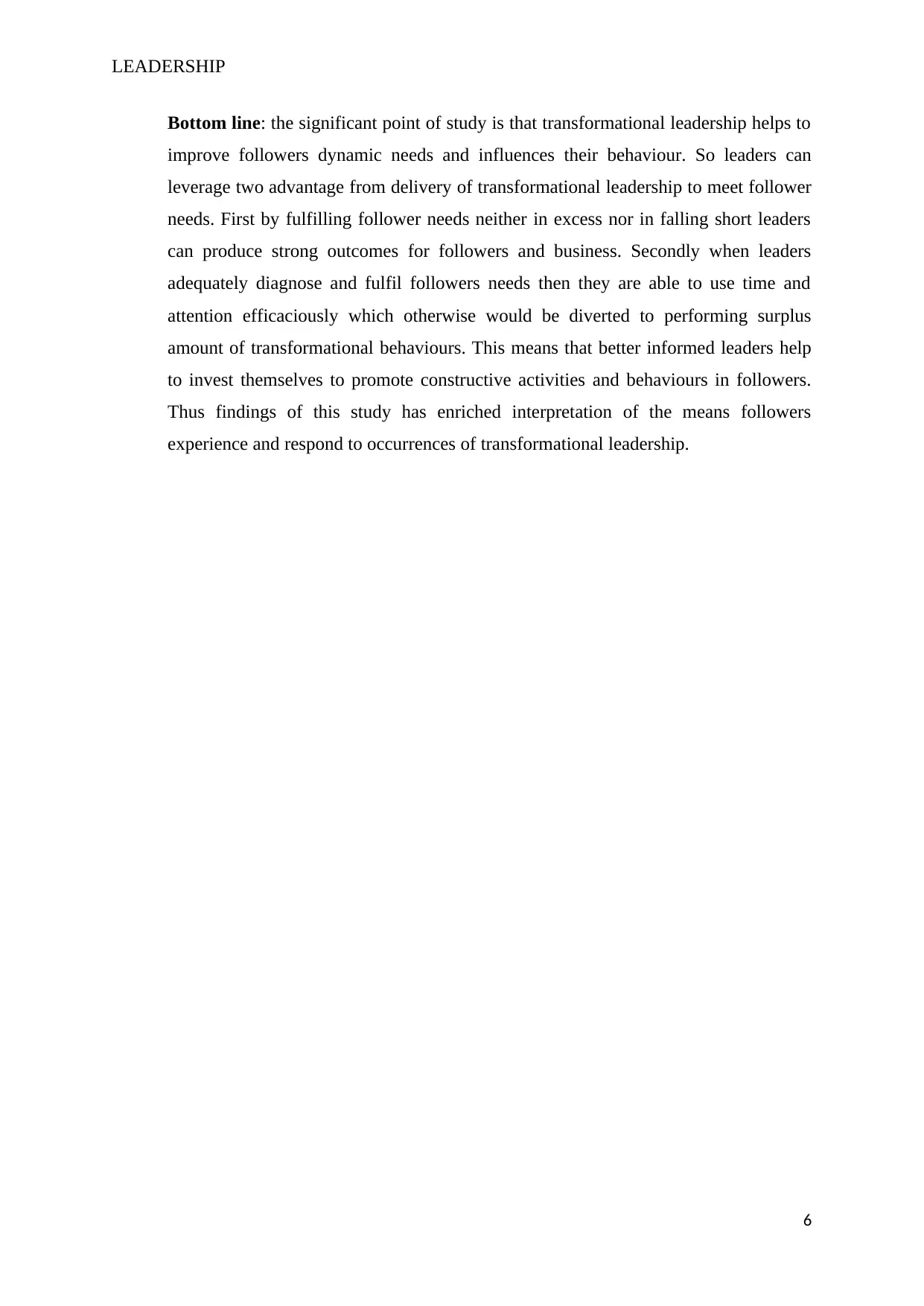
LEADERSHIP
Bottom line: the significant point of study is that transformational leadership helps to
improve followers dynamic needs and influences their behaviour. So leaders can
leverage two advantage from delivery of transformational leadership to meet follower
needs. First by fulfilling follower needs neither in excess nor in falling short leaders
can produce strong outcomes for followers and business. Secondly when leaders
adequately diagnose and fulfil followers needs then they are able to use time and
attention efficaciously which otherwise would be diverted to performing surplus
amount of transformational behaviours. This means that better informed leaders help
to invest themselves to promote constructive activities and behaviours in followers.
Thus findings of this study has enriched interpretation of the means followers
experience and respond to occurrences of transformational leadership.
6
Bottom line: the significant point of study is that transformational leadership helps to
improve followers dynamic needs and influences their behaviour. So leaders can
leverage two advantage from delivery of transformational leadership to meet follower
needs. First by fulfilling follower needs neither in excess nor in falling short leaders
can produce strong outcomes for followers and business. Secondly when leaders
adequately diagnose and fulfil followers needs then they are able to use time and
attention efficaciously which otherwise would be diverted to performing surplus
amount of transformational behaviours. This means that better informed leaders help
to invest themselves to promote constructive activities and behaviours in followers.
Thus findings of this study has enriched interpretation of the means followers
experience and respond to occurrences of transformational leadership.
6
1 out of 7
Related Documents
Your All-in-One AI-Powered Toolkit for Academic Success.
+13062052269
info@desklib.com
Available 24*7 on WhatsApp / Email
![[object Object]](/_next/static/media/star-bottom.7253800d.svg)
Unlock your academic potential
Copyright © 2020–2026 A2Z Services. All Rights Reserved. Developed and managed by ZUCOL.




